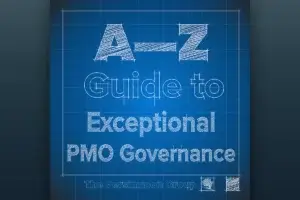5 Surprising Strategies to Advance Your Project Management Career
Demand for project managers over the next 10 years is expected to skyrocket relative to other career paths. But despite the growing need, project managers across industries report they are struggling to stand out in what they perceive to be a crowded field.
As project management advisors and consultants, Persimmon with PMOs and project-oriented professionals across the country. Over and over again, regardless of geography, we hear project managers asking:
- How can I build a reputation that results in employers calling me versus my chasing them?
- How can I prove to my company I’m ready for a high-stakes project?
- How can I improve my salary, without switching employers?
Google these questions, and you’ll get the obvious tactics—spruce up your LinkedIn profile, pursue a new degree or certification, and/or network better inside your company.
While these are important ideas, the real stand-out project professionals aren’t relying exclusively on the obvious strategies. We know this because we interview hundreds of project management professionals a year, seeking the very best talent to join our consulting team.
To achieve your next career breakthrough, try these five powerful approaches to advance your project management career:
-
Write a case study.
If you want to be memorable—either as a job applicant or a candidate for promotion—don’t tell us you’re “dynamic,” “innovative,” and “adaptable.” Show us. What specific new ideas or approaches did you try this year? Which ones did you throw away because they were no longer useful? What have you learned?
Think about your most recent experiences. Frame them up as a short “case studies,” like you might read in a business or trade magazine. What was the assignment? What did success look like? What did you try? What worked, and what didn’t? What was the ultimate result, and what did you learn?You can choose to share these with a potential employer, or simply use them to prepare for interviews.
When project managers can point to a specific innovation they’ve used in their practice, three things immediately become clear:
One, this is not a person we (or a client) will have to babysit. They will notice on their own when something isn’t working and step in to fix it.
Two, this is a person who is well-suited for the typically uncertain and unpredictable environment of most projects. After all, at its core, project management is the art and science of doing what hasn’t been done before. The best project managers are comfortable with ambiguity.
Three—and perhaps most importantly—innovators make the entire team stronger. Chances are good that not only will this be a solid stand-alone project manager, but the rest of my team will grow and improve FASTER because of their exposure to them.
Whether you are prepping for an interview or focused on demonstrating value to a current employer, a track record of fresh insights and ideas will instantly set you apart.
-
Leap Laterally to a New Industry.
Speaking of innovation, one of the biggest roadblocks to innovation is becoming an expert in something. Human beings rely on pattern recognition and routine building to become efficient. Since we like the feeling of being good at our job, over time we unconsciously begin to rely exclusively on these patterns and routines to be successful. In other words, we stop searching for or seeing new ideas, possibilities, and approaches.
In the field of project management, we are uniquely positioned to avoid this because our discipline is industry-agnostic. In other words, we have the ability to make lateral moves to new industries or project types without setting our career back.
So, to move forwards, try moving sideways first.
Getting experience in a second or third industry could be just the shake-up you need to keep progressing in your craft—not to mention, a powerful resume-builder that can help you later in a down market or industry disruption.
-
Get Rave Reviews (Not References).
Out of the hundreds of resumes I’ve reviewed, perhaps 20 have pre-emptively included references. Out of those, only a handful included persuasive, compelling quotes from colleagues about their work (with contact information to verify by phone.) Nearly all of those were hired.
When you purchase a product or service, one of the first things you do is read the reviews. For most people, simply seeing “five stars” is insufficient to pull the trigger on a large purchase. The majority of us read at least a few of the top comments to get a better sense of the product.
Now imagine that to read those reviews, you had to call Amazon and speak to the reviewer over the phone. Crazy, right?
Don’t make the same mistake on your resume or in performance conversations. Compelling, persuasive testimonials about what it’s like to work with (or for) you are a huge marketing asset. They should be a clear and visible part of your career profile or promotion conversation.
-
Publish Your Thought Leadership.
Did you know that the field of project management is replete with both print and digital opportunities to share your knowledge? The Project Management Institute (PMI) produces a variety of publications, several of which take submissions from the public. In addition, PMI owns projectmanagement.com, a place where you can set up a public profile and self-publish articles for the community. (This is also a way to collect PDUs to maintain your PMP® certification.)
If you aren’t a strong writer, consider pulling the core content together and hiring a professional copywriter to polish it for you. This service is not as expensive as you might think, and even just sharing three to five articles on your LinkedIn or Projectmanagement.com profile—focused on your core areas of strength and interest—can be a great way to build public credibility, and gain exposure to people who may be willing to help you find your next role.
-
Flex into a Second Project-Oriented Role.
As the field of project management grows, so do the tangential roles and positions that organizations use to support projects. While you don’t need to switch your career path or become an expert Business Analyst or Scrum Master, gaining exposure and experience in these related roles can broaden your perspective and create added value for the organization(s) you serve.
For example, with Business Analysis training, you’ll be better able to identify when there are gaps in requirements, unaddressed business risks in the project management plan, or aspects of a product that aren’t being adequately considered and analyzed. You’ll be better able to collaborate with and support the BA assigned to your project, and plan business analysis activities into your schedule.
On a practical level, adding a second competency creates career resilience and strengthens the business case for a company to keep you on, even during lean times.
Ready to Grow?
The saying is true: to get exceptional results, you must take exceptional action. Education, certifications, training, and a polished web presence are critical…but they’re just the “entry fee” to one of the most rewarding careers in the corporate world. Embrace these five “non-obvious” strategies (or pioneer your own!) to fuel your next breakthrough.
Interested in working at The Persimmon Group? Click here to read about a Persimmon career, or consider connecting with our Persimmon team on LinkedIn to find out what it’s like to work as part of our incredible team!
The Project Management Professional (PMP) is a registered mark of the Project Management Institute, Inc.









